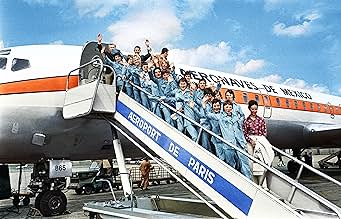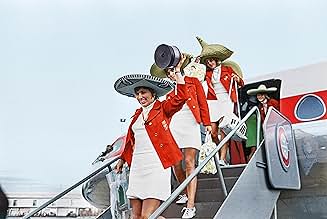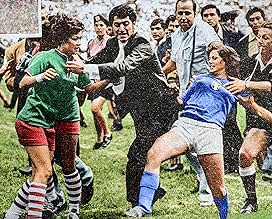Contada por las mujeres pioneras que participaron en ella, la extraordinaria historia de la Copa Mundial de Fútbol Femenino 1971, un torneo presenciado por multitudes récord que ha quedado f... Leer todoContada por las mujeres pioneras que participaron en ella, la extraordinaria historia de la Copa Mundial de Fútbol Femenino 1971, un torneo presenciado por multitudes récord que ha quedado fuera de la historia del deporte - hasta ahora.Contada por las mujeres pioneras que participaron en ella, la extraordinaria historia de la Copa Mundial de Fútbol Femenino 1971, un torneo presenciado por multitudes récord que ha quedado fuera de la historia del deporte - hasta ahora.
- Dirección
- Guión
- Reparto principal
- Premios
- 2 premios y 10 nominaciones en total
Jaime De Haro
- Self
- (voz)
Stanley Rous
- Self
- (metraje de archivo)
Reseñas destacadas
This film brought me so much joy but also left me with a sad rage. To think of where women's football could be now if it wasn't for frail male egos. It's such a well made film and all ex players involved tell the story so well, you can see how emotional they still are and what it meant to be a part of this wonderful tournament that was hidden from history. The match footage is so well restored and it felt amazing to see it on the big screen. I just wish we hadn't been denied so many years of great tournaments and a history of great players. It ended on a positive though, as someone who regularly attends matches and follows the WSL and the Lionesses passionately I feel very confident that the sport will continue to grow. It's a testament to those wonderful players in 71.
I felt that in the beginning they laid the abnormality of all women's football on a bit thick but I found that once they got that out of the way we can learn more about the players, the match and the game. That opening does tell you what they are talking about and the angle that they are approaching the story from the get go.
Which is a good angle as most everyone (in our society) would have been allowed or recommended to play a game of football in their lifetime. Even then the turn out for professional football between the sexes is a staggeringly large difference and when you combine these two factors and a apply them to 1970s with a packed stadium with all female players and no ones heard about it, that's nothing short of a head scratcher.
It's interesting that this isn't more famous as it's pretty important in terms of women's sport and the sport of football in general. I would say that this game and documentary are meant to empower other women. Although I must confess I am clueless when it comes to sport and would never have found out about this independently. I am happy to say that I have actually learned a good bit about women's sport over the course of this documentary and I am thankful for that.
Which is a good angle as most everyone (in our society) would have been allowed or recommended to play a game of football in their lifetime. Even then the turn out for professional football between the sexes is a staggeringly large difference and when you combine these two factors and a apply them to 1970s with a packed stadium with all female players and no ones heard about it, that's nothing short of a head scratcher.
It's interesting that this isn't more famous as it's pretty important in terms of women's sport and the sport of football in general. I would say that this game and documentary are meant to empower other women. Although I must confess I am clueless when it comes to sport and would never have found out about this independently. I am happy to say that I have actually learned a good bit about women's sport over the course of this documentary and I am thankful for that.
You would have to be mad not to have come to the conclusion that FIFA is populated with grey, humourless, rule-book wielding bureaucrats. And thats not to even mention the corruption, what with the bribes, the thousands of migrant workers dead building large stadiums when a rich desert country with no interest in football was awarded a World Cup or what about when Legia Warsaw unveiled a huge banner to commemorate the murdered 160,000 Poles by the Nazis in the Warsaw Uprising - FIFA's response to this act of education and remembrance? A £42,000 fine for Legia Warsaw of course! But don't worry because this film clearly indicates that FIFA were also 24 carat bell-ends way back in 1971 as well! Well, consistency is a positive attribute of sorts I guess.
This film tells a pretty amazing story in a lot of ways. Amazing because hardly anyone seems to have known a thing about it for 50 years. It's the story of the first women's World Cup which happened way back in 1971. But it doesn't count as the first women's World Cup...because FIFA didn't 'approve' it. Furthermore, they insisted that the Mexican clubs pencilled in to host the thing must under no circumstances do so or face heavy fines. Ironically, their petty intransigence led to the tournament being forced to be played out in the two largest stadiums in the country which were not under FIFA jurisdiction, including the iconic Azteca stadium in Mexico City. Whats actually fairly incredible was that the promoters succeeded epically in selling the tournament and games played out to crowds of 110,000 in an uproarious atmosphere. The competition itself looked amazing and, like the legendary men's World Cup of 1970, clearly benefitted from being played out in such a passionate environment. There are silky skills, 1970's assaults...I mean legitimate tackles, an unfeasibly bad tempered semi-final between Italy vs Mexico where in one photograph we have the brilliantly incongruous sight of an Italian player who looks like Claudia Cardinale being held back from physically assaulting a Mexican opponent, there's a pay strike on the eve of the final, there's amazing goals chalked off for questionable technicalities and its all narrated by gloriously over-the-top Latin football commentary - in other words, its entertainment all the way! The tournament even had a super-cool looking mascot!
So, you may think, this is great - football at its most life-affirming! This will take the game forward! Meanwhile, back in Switzerland...FIFA continued to take the huff. The women received bans, some were barely acknowledged in their own countries for their efforts and many became quickly disillusioned with the game due to some very poor treatment. The tournament was to all intents and purposes buried. The doc is made up of the remembrances of many of the participants from the various competing teams. I found all these women to be full of humour and vitality. They have been treated pretty poorly though. It wasn't until 20 years after this event that the first official FIFA sponsored women's World Cup took place. To me, it seems like a no-brainer for this to now be officially regarded in the history books as the first female World Cup - after all, the first men's one in 1930 was invitation only and that's official. You would think after all the things they have got so epically wrong over the last few years that FIFA could do something positive, do the right thing and make this tournament official...but will they?
This film tells a pretty amazing story in a lot of ways. Amazing because hardly anyone seems to have known a thing about it for 50 years. It's the story of the first women's World Cup which happened way back in 1971. But it doesn't count as the first women's World Cup...because FIFA didn't 'approve' it. Furthermore, they insisted that the Mexican clubs pencilled in to host the thing must under no circumstances do so or face heavy fines. Ironically, their petty intransigence led to the tournament being forced to be played out in the two largest stadiums in the country which were not under FIFA jurisdiction, including the iconic Azteca stadium in Mexico City. Whats actually fairly incredible was that the promoters succeeded epically in selling the tournament and games played out to crowds of 110,000 in an uproarious atmosphere. The competition itself looked amazing and, like the legendary men's World Cup of 1970, clearly benefitted from being played out in such a passionate environment. There are silky skills, 1970's assaults...I mean legitimate tackles, an unfeasibly bad tempered semi-final between Italy vs Mexico where in one photograph we have the brilliantly incongruous sight of an Italian player who looks like Claudia Cardinale being held back from physically assaulting a Mexican opponent, there's a pay strike on the eve of the final, there's amazing goals chalked off for questionable technicalities and its all narrated by gloriously over-the-top Latin football commentary - in other words, its entertainment all the way! The tournament even had a super-cool looking mascot!
So, you may think, this is great - football at its most life-affirming! This will take the game forward! Meanwhile, back in Switzerland...FIFA continued to take the huff. The women received bans, some were barely acknowledged in their own countries for their efforts and many became quickly disillusioned with the game due to some very poor treatment. The tournament was to all intents and purposes buried. The doc is made up of the remembrances of many of the participants from the various competing teams. I found all these women to be full of humour and vitality. They have been treated pretty poorly though. It wasn't until 20 years after this event that the first official FIFA sponsored women's World Cup took place. To me, it seems like a no-brainer for this to now be officially regarded in the history books as the first female World Cup - after all, the first men's one in 1930 was invitation only and that's official. You would think after all the things they have got so epically wrong over the last few years that FIFA could do something positive, do the right thing and make this tournament official...but will they?
This is a documentary film of the 1971 Women's World Cup in Mexico. This opens with an interview with Brandi Chastain. The interviewer shows her footage from a 1971 game and she is shocked. She had never seen nor known of such an event.
This is amazing true history that apparently nobody but only those who witnessed it would remember. This does a great job documenting it with the ladies. I would like more from the men who created it and ran it. There is more story from that angle especially after the event. I want to know who and how this event was essentially erased. There needs to be more revelation than The Men. I would also like to know where that trophy is now.
This is amazing true history that apparently nobody but only those who witnessed it would remember. This does a great job documenting it with the ladies. I would like more from the men who created it and ran it. There is more story from that angle especially after the event. I want to know who and how this event was essentially erased. There needs to be more revelation than The Men. I would also like to know where that trophy is now.
"Copa 71" premiered at TIFF last month, and made its US debut at DocFest as part of the Seattle Independent Film Festival. It received rave reviews at both, so it's telling that as of this writing it's currently rocking a 4.5/10 on IMDb for what is probably the most egregious sin of all-- treating women like human beings.
The film has one primary focus, as shown in the title: In 1971, in Mexico City and Guadalajara, a non-FIFA Women's World Cup was held. Six teams were invited, and where the tournament holders imagined it a sideshow, they had dollar signs in their eyes and stadiums to fill (FIFA denied them the use of the regular stadiums, so they were 'forced' into the two largest stadiums in the country).
As a film, its focus is narrow, but that singular focus is so utterly fascinating, and the players so passionate, that this is hardly a complaint. The burial of this sporting event is mentioned barely at all, the film doesn't even make mention of the next (also overlooked) women's tournament in 1985, skipping to the first official FIFA sanctioned event in 1991.
These are minor concerns, as the film is necessary both as an educational tool, and as a historical document. I'm male, I've got a basic familiarity with soccer, but like all great sports documentaries, you can go in blind and be captivated by the story they're trying to tell, regardless. Yes, the open sexism these women had to deal with is still alive and well (see: the current IMDb rating), but that is less the focus than the very real fact that even in 1971, women playing soccer sold out a 110,000 seat stadium.
You can't not love these women, unless you're the unfortunate type of person who never cared for women in the first place. If that's you, you don't need to review bomb, just find something else to be mad about. Women's soccer is the fastest growing sport in the world, and this documentary is a testament that it's been a long time coming.
The film has one primary focus, as shown in the title: In 1971, in Mexico City and Guadalajara, a non-FIFA Women's World Cup was held. Six teams were invited, and where the tournament holders imagined it a sideshow, they had dollar signs in their eyes and stadiums to fill (FIFA denied them the use of the regular stadiums, so they were 'forced' into the two largest stadiums in the country).
As a film, its focus is narrow, but that singular focus is so utterly fascinating, and the players so passionate, that this is hardly a complaint. The burial of this sporting event is mentioned barely at all, the film doesn't even make mention of the next (also overlooked) women's tournament in 1985, skipping to the first official FIFA sanctioned event in 1991.
These are minor concerns, as the film is necessary both as an educational tool, and as a historical document. I'm male, I've got a basic familiarity with soccer, but like all great sports documentaries, you can go in blind and be captivated by the story they're trying to tell, regardless. Yes, the open sexism these women had to deal with is still alive and well (see: the current IMDb rating), but that is less the focus than the very real fact that even in 1971, women playing soccer sold out a 110,000 seat stadium.
You can't not love these women, unless you're the unfortunate type of person who never cared for women in the first place. If that's you, you don't need to review bomb, just find something else to be mad about. Women's soccer is the fastest growing sport in the world, and this documentary is a testament that it's been a long time coming.
¿Sabías que...?
- CuriosidadesCarol Wilson, who played was the England captain in the tournament, was only 19 years old at the time. Three of her teammates, Leah Caleb (age 13), Gill Sayell (14) and Chris Lockwood (15) were still schoolgirls when they played in the tournament.
Selecciones populares
Inicia sesión para calificar y añadir a tu lista para recibir recomendaciones personalizadas
- How long is Copa 71?Con tecnología de Alexa
Detalles
- Fecha de lanzamiento
- País de origen
- Sitios oficiales
- Idiomas
- Títulos en diferentes países
- Copa '71 - succén som tystades ner
- Empresas productoras
- Ver más compañías en los créditos en IMDbPro
Taquilla
- Recaudación en todo el mundo
- 197.067 US$
- Duración
- 1h 30min(90 min)
- Color
- Relación de aspecto
- 2.00 : 1
Contribuir a esta página
Sugerir un cambio o añadir el contenido que falta
























